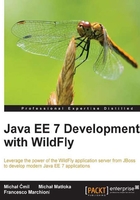
The WildFly 8 directory layout
The difference between standalone and domain reflects in the directory layout of the application server is shown in the following diagram:

As you can see in the preceding diagram, the WildFly directory layout is divided into two main parts: the first one is pertinent to a standalone server mode and the other is dedicated to a domain server mode. Common to both server modes is the modules directory, which is the heart of the application server.
WildFly is based on the JBoss Modules project, which provides an implementation of a modular (nonhierarchical) class loading and an execution environment for Java. In other words, rather than a single class loader that loads all JARs into a flat class path, each library becomes a module, which only links to the exact modules it depends on and nothing more. It implements a thread safe, fast, and highly concurrent delegating class loader model, coupled with an extensible module resolution system. This combines to form a unique, simple, and powerful system for application execution and distribution.
The following table details the content of each folder present in the root folder of JBOSS_HOME:

Digging into the standalone mode tree, we can find folders that are pertinent to standalone independent processes. If you have experience with earlier server releases, you will find these folders quite intuitive to you:

The domain directory structure is quite similar to the standalone equivalent, with one important difference. As you can see from the following table, the deployments folder is not present since the domain mode does not support deploying content based on scanning a filesystem. We need to use the WildFly managed instruments (CLI and web admin console) in order to deploy applications to a domain.
